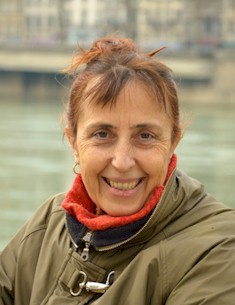|
.
Academic education
-
Master’s degree in psychology, Université de Paris VIII, Paris, France
-
Bachelor’s degree in English language, Université de Strasbourg, France
-
Master’s degree I in journalism, Université de Strasbourg, France
Practical training
-
Training in Dynamical Neurofeedback
-
Training in Emotional Freedom Technique (EFT), with Matrix Reimprinting
-
Trained as a bodymind psychotherapist at the Institute for Training in Communication and
Therapy (IFCC), Strasbourg, France
-
Trained as a gestalt-therapist at the School of Gestalt and Experiential Teaching of Paul Rebillot, San Francisco, United States
Professional associations
Theoretical orientation:
Bodymind techniques:
Psychological services offered
Clients:
-
Adults, Teenagers, Children, Families, Friends…
Spoken languages:
Research and interests in psychology
-
Traumatism, post-traumatic stress disorder (PTSD): fragility factors and resources for recovery.
-
Trauma treatment, with several tools from Gestalt therapy and the approaches of Peter Levine, of Muriel Salmona and of Pat Ogden, grounded in the physiology of trauma, and accompanied by EFT.
-
Emotions: How can we let them be without being overcome by them? Being at peace with our emotions.
-
Body and psychotherapy: the body's memory and its power. Because the body remembers, protects, prevents and allows, it is worthwhile exploring he link between our body, emotions and expression.
-
Relational difficulties, relational competencies: how to use the resources of communication and soothing emotions to unbind negative automatic behaviours.
-
Stress, anxiety, and depression.
-
Health psychology: the sick body, the suffering body, healing the body.
-
Separation and grieving.
-
Violence, aggressiveness, anger, and repressed emotions.
-
Phobias and obsessive-compulsive disorders stemming from anxieties and fears that we never expressed nor discharged and that manifest themselves in uncontrollable symptoms.
-
Existential crises, life stages and changes, ill-being and wellbeing throughout marriage, divorce, moving, birth of children, loss of close friends or relatives…
-
Choosing and shaping one’s orientation in work relationships: hierarchies, colleagues, peers, managers. What boundaries? Which contacts and contracts? How to know and invest ones strengths, contribute fruitfully and achieve professional fulfilment?
-
Couples: love, respect, sharing, limits, contract, splitting up or staying together, choosing to be dependant, co-dependant, independent, or interdependent. Couples therapy, marriage and family counselling.
-
Parents and children: grounding authority in trust, to be earned and kept alive. Violence between parents and children: What contract should they build with each other? And with society? In new families, how to ensure space and participation for each member?
-
Children: accompanying and supporting their development. Tools: playing, drawing, dialogue. Positive parenting.
-
Motherhood, fatherhood: to be – or not to be – a parent.
-
Attachment. We need nourishing ties. But these ties must be healthy and help us reach balance. And how can we untie ties that bind when necessary? We can go back to the source of our first attachments and heal them to open up to balanced relationships.
-
Addiction -- to a person, substance, or behaviour -- a symptom of deep traumas that need healing.
-
Incest, paedophilia. Treating such traumas involves talking about them in a safe environment and being supported to heal.
-
Ageing: beyond appearances. What transformations do we experience? What transformations do we desire? Sometimes we fear ageing because we feel we have not fully lived a period of our life. What do we want to accomplish in this getting older? Do we want to pass on something? What meaning do we want to give to our life, more than ever?
-
Roots: mother language and adopted language, motherland and land of exile, adoptive homeland. Whether feeling exiled in one’s own land or too deeply ingrained, what place do we want, among others and with them? Exploring social origins and social trajectory, finding people to belong to and peace in our ties.
-
Dealing with children. Children may reawaken aching knots or question what we learnt as ready-made truths. We can feel destabilized. This is an opportunity to seize to understand more about ourselves, clarify the situation, and distinguish the weight of the past from the current situation. Healing from our past allows us to redirect naturally our path through life.
|
